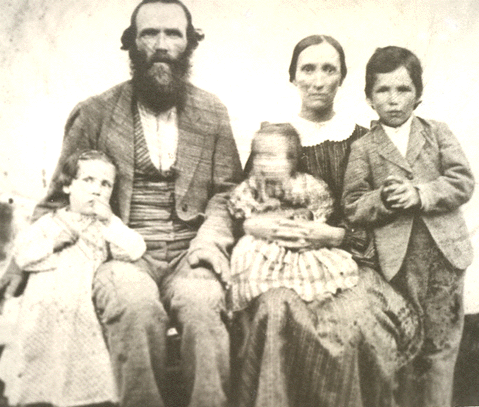
THOMAS FARTHING was involved in the second battle of Manassas, 1862. Generally he served under General JEB STUART. According to records, he was involved in many skirmishes and battles in Virginia. He was serving with General Stuart near Yellow Tavern, Virginia, where the General was killed. THOMAS FARTHING suffered severe head wounds with shrapnel 1864 near Petersburg, Virginia.
(NOTE: The following account of the major battle at GETTYSBURG, PA. was added by my nephew, Ben Farthing, at my request).
On the last day of the Battle of Gettysburg, (JULY 3,1863) Lee ordered JEB Stuart's cavalry to attack the rear of the Union army. Lee believed that if these four thousand horsemen could create enough pandemonium, the Federals would be distracted from the main infantry assault that was about to be launched against their front lines. In his book Lost Triumph, Tom Carhart believes that it was Lee's intention to cut the union army in half and then destroy it piecemeal. Tom Farthing's unit, the First North Carolina Cavalry, was out in front with several other regiments leading the charge. Lee's plan was only foiled by a suicidal counter-attack led by the youngest general in the union army, George Armstrong Custer. When the two forces met, witnesses said that the collision sounded like thousands of trees falling in the forest all at once. Horses were hurled up in the air end over end to come crashing down on top of their riders. With Stuart's attack prevented from reaching the rear of the union lines on Cemetery Ridge, Lee's frontal assault was doomed. To this day Pickett's Charge is looked upon as the turning point of the American Civil War.
My mother's MATERNAL Grandfather, MARSHALL GREER, was shot in the neck and captured at Gettysburg, 1863, and was sent to the Union Prison at Point Lookout, Maryland. Also, my mother's PATERNAL Grandfather, SIMEON GLENN, was killed in battle in North Carolina, in 1865. His regiment got into battle with General William Sherman's Union troops and many were killed. This occurred 2 or 3 days after the Armistice had been signed, ending the War, however, word had NOT REACHED these troops!.
Thomas Farthing's brother, WILLIAM WATKINS FARTHING, was killed in battle 1863 at BRANDY STATION, VIRGINIA. Also, his brother WHITFIELD FARTHING was captured in 1864 at PETERSBURG, VIRGINIA and sent to the union prison at Point Lookout, Maryland.
The following is a partial list of other members of the FARTHING family from WATAUGA COUNTY, N.C. who were killed, wounded or captured in the conflict. Some of them who stayed behind, were attacked and killed at home by BUSHWACKERS.
THOMAS'S FATHER, REUBEN PICKETT FARTHING was robbed and terrorized by bushwackers on his farm in Watauga County, N.C. during the war. A first cousin, John Farthing, was injured by gunfire in the second battle of Manassas, and was captured and sent to Union prison at Camp Chase, Ohio. Another first cousin, Robert Farthing, suffered injuries to his right arm, which was amputated in the battle of Gaines Mill. First cousin, James Farthing, was shot in the head and killed at the battle of Fredericksburg, Virginia. First cousin, Henry Harrison Farthing, was wounded in his shoulder and back in the SECOND battle of Manassas, 1862. Uncle, William Young Farthing, was captured at the Battle of Hanover Courthouse. After being released from prison, died from pleurisy. Another uncle, Paul Farthing, died as prisoner of war at Camp Chase, Ohio. First cousin, Thomas J. Farthing, died of typhoid fever in a Confederate hospital. Second Cousin, Reuben P. Farthing, captured and died while a prisoner of war at Camp Chase, Ohio. Brother, James Hervey Farthing, shot by bushwackers at his farm in Watauga County and left for dead. After THOMAS FARTHING was discharged , he returned to Watauga County, N.C. and married Celia Greene. They had eight children. William was the oldest. Three children died shortly after birth, and five lived to adulthood.Thomas Brown Farthing was never well, due to war injuries, and died in 1886 on his father's farm located on the Watauga river. William was 19 when his father died.
THOMAS FARTHING'S father was REUBEN PICKETT FARTHING (born 1809 ). Reuben Farthing was a Baptist minister and farmer.
The above Civil War information, was researched and compiled by my nephew BEN FARTHING of LENOIR, N.C.
PREVIOUS PAGE......NEXT PAGE